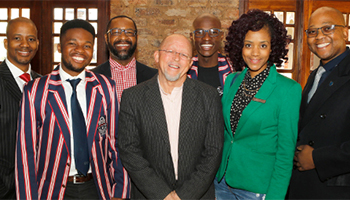Latest News Archive
Please select Category, Year, and then Month to display items
08 April 2021
|
Story Thabo Kessah
|
Photo UFS Photo Archive
 Dr KPD Maphalla with former UFS Chancellor, Dr Franklin Sonn, during the graduations in April 2007.
Dr KPD Maphalla with former UFS Chancellor, Dr Franklin Sonn, during the graduations in April 2007.
The University of the Free State is sad to learn of the passing of alumnus and award-winning Sesotho literary giant, Dr KPD Maphalla.
The literary works of Dr Khotso Pieter David Maphalla, like many other African writers and artists, were influenced and characterised by his own era of powerful forms of oppression and exclusion from dominant literary discourses. In his own right and through his writings of poetry, novels, short stories, and kodiamalla (dirge), he articulated a deliberate political and social protest and pushed for a place for African languages in literature at the height of apartheid.
“He entered the professional scene with his ground-breaking novel, Kabelwamanong, in 1982 at the age of 27. His career actually started in 1971 while he was still at school. Since his first novel, he has produced at least two books annually, covering the genres of poetry, novels, dramas, and short stories. As a dramatist, Dr Maphalla has written a number of excellent and educative radio dramas for the then Radio Sesotho (now Lesedi FM),” said his long-time friend and Head: African Languages at the University of the Free State, Dr Nyefolo Malete.
“It was for this writing prowess that he received recognition from the UFS when he was awarded an Honorary Doctorate in Literature by the Department of African Languages during a momentous ceremony on the Qwaqwa Campus in 2007,” added Dr Malete.
Dr Malete also revealed that, despite losing the use of his right hand after suffering a stroke following a car accident in the late 1990s, Dr Maphalla continued writing using his left hand. “He was adamant that, what he referred to as his ‘supposed disability’, would not deter his passion for writing.”
Dr Maphalla’s work has also produced numerous scholarly studies by the likes of Profs Moleleki Moleleki (protest poetry), Thapelo Selepe (lament and protest poetry), and Dr Seema Seema (process of cross-cultural communication). He was a committed Qwaqwa community member, who was also instrumental in the founding of Qwaqwa Community Radio (2000) and Metjodi Writers (2006), among others. He has written more than 70 books, many of which have been prescribed texts in schools.
Some of the awards he has won include:
South African Centre for Digital Language Resource (SADiLar) Sesotho Lexicographic Unit (Sesiu sa Sesotho) Lifetime Award for outstanding literary works and for promoting Sesotho literature (2019).
The Literature Festival and the University of the Free State Award for enormous contribution to Sesotho literature by a South African writer (2019).
Lifetime Achiever Award in Literature awarded by the Department of Arts and Culture (2005).
M-Net Book Prize for Sesotho poetry (2005). The first and thus far the only Sesotho author to have received this honour.
M-Net Book Prize for best novel (1996).
De Jager-HAUM Literary Award for his volume of short stories, Mohlomong Hosane (1993).
Thomas Mofolo Trophy for Best Novel, Best Poetry, and the Overall Award (1992).
Thomas Mofolo Trophy for Best Poetry (1991).
Dr JJ Moiloa Floating Trophy for Best Sesotho Poetry Book of the Year, Kgapa tsa ka (1985).
Student leaders take the lead by launching SRC Fund
2017-08-24

The Student Representative Council (SRC) launched the SRC Fund
at a Business Breakfast on the Bloemfontein Campus.
Photo: Johan Roux
The Student Representative Council (SRC) is not just asking for financial help, but is taking the lead by launching the SRC Fund. According to different guest speakers at a recent SRC Business Breakfast, the student leadership of the University of the Free State (UFS) is setting an example.
“They (the SRC) are saying to us and to you: We are not just saying that we want free education in our lifetime. We are also prepared to assist government in assisting universities however we can in that direction,” says Pura Mgolombane, Dean of Student Affairs at the UFS.
Objectives of fund
The SRC launched the SRC Fund on 4 August 2017 at the Centenary Complex on the Bloemfontein Campus in order to fight against financial exclusion of students. The fund aims to centre all forms of fundraising initiatives by students, decreasing financial barriers to UFS entry, and utilising and maximising networks within business enterprise, former SRC members, alumni, and student fundraising initiatives. It also wants to help with the creation of exposure and mentorship programmes, funds to assist with registration and financial exclusions, entrepreneur development, partnership opportunities, and increasing employment opportunities.
Initiatives such as Right2Learn will in future form part of the fund, and fundraising initiatives such as The Cycle Tour and Kovsies Biggest Braai has also been launched.
Internal and external partnerships
Prof Nicky Morgan, Vice-Rector: Operations at the UFS, says the SRC leadership is not just asking for money. He says they are a “can do leadership” who is asking others to help them to be successful. He also stressed the important relationship between the university and the city and asked that they should work together.
Sikhululekile Luwaca, President of the Bloemfontein SRC, said the SRC wants to “build internal and external partnerships, because universities are microcosms of society”.
“We cannot do it alone and that is why we are trying to bring the business part of it, the corporate enterprise, to also assist the SRC Fund to become sustainable.”